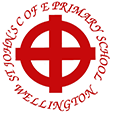Music
‘Our vision is to enable all children and young people to learn to sing, play an instrument and create music together, and have the opportunity to progress their musical interests and talents, including professionally.’
National Plan for Music Education (NPME) June 2022
At St. John’s, the intention is that children gain a firm understanding of what music is through listening, singing, playing, evaluating, analysing, and composing across a wide variety of historical periods, styles, traditions, and musical genres. Our objective is to develop a curiosity and love for this subject, as well as an understanding and acceptance of the validity of all types of music whilst incrementally developing pupils’ knowledge and skills. We are committed to ensuring children understand the value and importance of music in the wider community, and are able to use their musical skills, knowledge, and experiences to involve themselves in music, in a variety of different contexts. We also believe it is vital that every child experiences the learning of an orchestral instrument, taught by a specialist to support the NPME ‘ensuring every child has an opportunity to learn an instrument and to make progress with instruments is also essential’.
Intent
The Model Music Curriculum (MMC) sets out sequences of learning in the following key areas which, when taken together, all contribute towards the steadily increasing development of musicianship:
- Singing
- Listening
- Composing
- Performing/Instrumental Performance
Implementation
The music curriculum ensures students sing, listen, play, compose, perform and evaluate. This is embedded in classroom activities as well as weekly singing assemblies, various concerts, services, performances and in the learning of instruments. The inter-related dimensions of music are taught in classroom music lessons, with the aid of the online resource Sing Up. This enables the children to use musical language, and understand how music is composed, played, appreciated and analysed. Singing is embedded in classroom music lessons and children also learn how to play percussion instruments through various styles of music and musical activities. In Year 4 pupils have the opportunity to learn to play a tuned instrument and the accompanying notation. In doing so, the children not only develop their musical knowledge through learning an instrument, but also develop specific skills related to the instrument, including how to read basic music notation. They also develop ensemble and performance skills.
Creativity in music, both vocal and instrumental, is included in all music lessons where children learn how to compose, which in turn feeds their understanding when listening, playing, or analysing music.
Impact
In addition to class music lessons, pupils are given the opportunity to perform in school, peer to peer as well as to parents/carers and our local community. These performances may take the form of assemblies, concerts/shows, church services, festivals and carol singing. In KS2, children have the opportunity to join the school choir which performs regularly at school events, and within the local community and town. These experiences enable children to gain musical confidence alongside learners from other schools and backgrounds. Visits to local nursing homes by the school choir not only provide an opportunity to refine performance skills, but also provide a valuable opportunity to share our school values of compassion, respect and service.
Music helps children develop an understanding of different cultures and history. Children are able to enjoy music in as many ways as they choose - either as creator, performer, or listener. Children learn fundamental music techniques and knowledge in order to develop their musical understanding. This enables them to take the next step with their musical skills in the future, should they choose to do so.
Music in the Early Years
In EYFS, children begin to learn musical skills through the Early Learning Goals of ‘Communication and Language’, ‘Physical Development’ and ‘Expressive Arts and Design’.
The children:
- Listen carefully to rhymes and songs, paying attention to how they sound.
- Learn rhymes, poems and songs.
- Combine different movements with ease and fluency.
- Explore, use and refine a variety of artistic effects to express their ideas and feelings.
- Return to and build on their previous learning, refining ideas and developing their ability to represent them.
- Create collaboratively, sharing ideas, resources and skills.
- Listen attentively, move to and talk about music, expressing their feelings and responses.
- Sing in a group or on their own, increasingly matching the pitch and following the melody.
- Explore and engage in music making and dance, performing solo or in groups.


